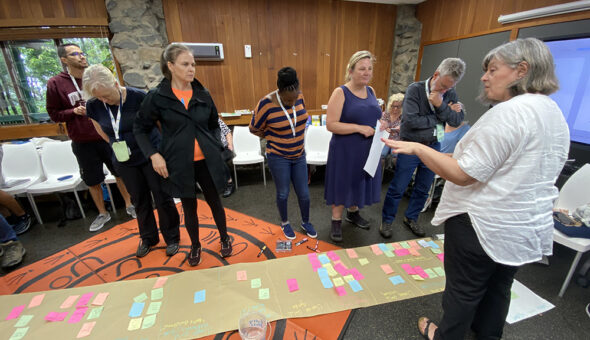Shona McIntosh, Rachel Wilder, Abena Baiden, Angie Bailey, Clare Hawkes, Hannah Hogarth, Lizzi Milligan, Bukola Oyinloye were contributors to the Epistemically Just Methodologies 2021 Seminar Series, University of Bath
In the previous blog, we introduced the seminar series on which these reflections are based. We shared the view that ethical processes are complex and emerge in relationships between researchers and research participants.
In this post we widen the viewpoint to consider how multiple, varying and emergent contextual factors shape the ethical process and relationships within it. When tied in with acknowledging research participants’ complex identities and histories (that are often excluded from research), we begin to question ethical guidelines that are prescriptive and adopt singular – often Euro-centred – views of knowledge, characteristic of institutional approaches to ethics (Oyinloye, 2021).
Using a wide-angled lens
If we think of research as a cinematic landscape, data collection involving participants might be compared to a close-up. But zooming out makes us aware of what close-ups leave out. What sits beyond the margins of the shot/research but is central to participants’ lives? How does omitting this from research affect the self that participants bring to the research relationship? We ask what happens when we see research in relation to whole people: all their lives, their knowledges, their cultural context.
As researchers, we select communities and individuals to involve in our projects. And we selectively focus on some ‘data’ over others although we listen to or observe participants’ talk and behaviour in specific contexts. In doing so, we exclude multiple aspects and establish partial human participants, separated from their language, their knowledge and their lives.
Ethically accepted ways of acknowledging participants in research, for example through defining our sample in a paper or thesis, effectively reduce each human life and minimise their part in the knowledge they co-created.
Who or what is out of shot?
How often do we recognise the significance of non-humans in our research? Are we likely to exclude those plants, animals, objects and clothing that inform relationships built with research participants? Maybe we can also think about humans in relation to non-human elements with which we share our planet.
When we question why some things - people, animals, plants, objects - are excluded in research, we unsettle the position of researchers as the ones who tell the stories of the world. If these dominant epistemologies remain unchallenged, the world is solely interpreted by the group marked as entitled to do so (Stengers, 2018). The issue then becomes existential: when some experiences of the world are erased from the narratives that weave our social realities (Bruner, 1996) we are complicit in perpetuating social and epistemic injustices. We need to think about the exclusion of certain knowledge(s?) and how, in omitting research results, we may bring harm to the participant.
For example, research participants who experienced having their babies removed from them in mother and baby homes in Ireland felt injustice that the deeply personal stories they had shared with researchers were not included in the final report of the research. experienced this injustice as a lost opportunity to change future practices in this area by communicating their stories to policy makers, which for some participants was their motivation for contributing to the research. The researchers failed to see the damage they would inflict by excluding these mothers’ stories from their research findings.
Prioritising reciprocity in ethics
Could foster agile and relevant co-directed responses to emergent knowledge and connected futures? By thinking of non-human, or more-than-human, subjects we can see a broader picture and, in negotiation, decide when and how to focus in on which details, and de-centre from dominant (human) perspectives.
Essentially, by recognising our power and expressing our gratitude for research participants’ generous will to take part, we prioritise the development of caring relationships with participants. Can institutional ethics really ensure a way of doing research that cares for those participating in the research? And in ways that are meaningful to their lives? The effect of the institutional ethical process on research participants is a question we take up in the final of this series of posts.
References
Bruner, J. (1996) The culture of education. Cambridge, Massachusetts: Harvard University Press.
Oyinloye, B. (2021) Towards an Ọmọlúàbí code of research ethics: Applying a situated, participant-centred virtue ethics framework to fieldwork with disadvantaged populations in diverse cultural settings. Research ethics. April 2021. doi:10.1177/17470161211010863
Stengers, I. (2018) Another science is possible: a manifesto for slow science. Translated by S Muecke. Cambridge: Polity Press.
Respond
